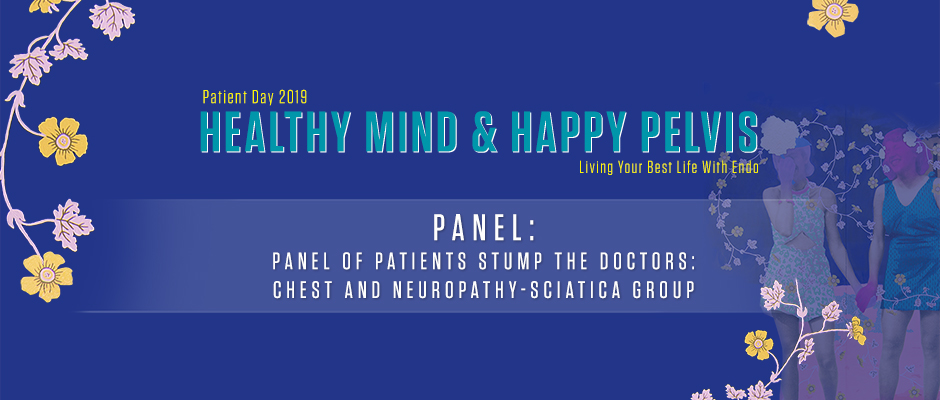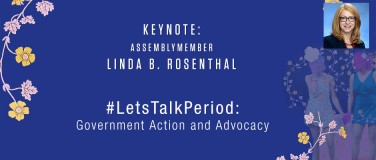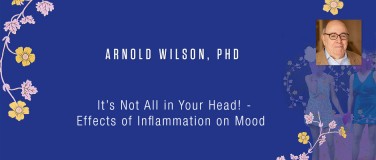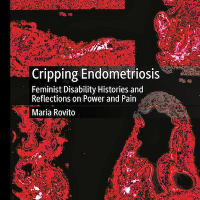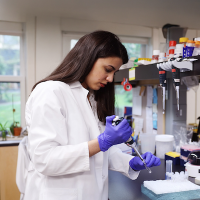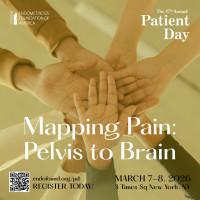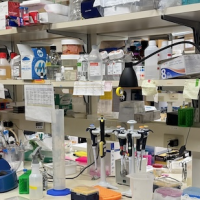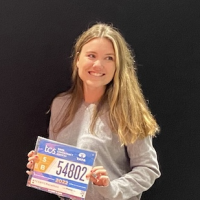Panel: Patients Stump the Doctors - Bowel & Bladder
Patient Awareness Day 2019: HEALTHY MIND & HAPPY PELVIS
Living Your Best Life With Endo
March 10, 2019 (8am - 5pm)
Einhorn Auditorium, Lenox Hill Hospital, New York City
https://www.endofound.org/patientday/2019
Lena wrote an article and she was very open about her experiences and do you want to give a little short tidbit about what you've gone through.
Yep, very quickly.
Washington Post.
This was Washington Post and it was a little odd talking about such personal, intimate things about your life to a national publication, but one of the reasons I decided to do so, when Dr. Seckin brought it up is because I really had a hard time getting diagnosed. I feel like until I came to see him and his team I really self-diagnosed by Googling a lot, and I thought that if it's out there someone someday can look up endo and kidney and pull it up and run to their doctor because ... I was very lucky actually. For most of my life I was extraordinarily average in terms of health. I only exhibiting symptoms in 2011, and my symptoms were very odd. I had pain in my lower back and going down my leg. I didn't have any pain in my pelvis. I didn't have ... you know, I just had my period and cramps, but nothing really extraordinary or so I thought.
When I went to an internist, my OB/GYN with whom I've been for many years, they did pelvic sonogram, vaginal sonogram, uterine biopsy, all was fine. Everyone looked at me and said, "You're getting old, you're getting fat. It's sciatica. Go exercise. Lose some weight." Which is ... I'm not saying it's not valid, we could all ... I could lose some weight. I started doing Pilates, I started doing all kinds of things for my back and nothing would happen and actually every time I'd have my period, pain would get worse.
A few years later it wasn't only during my period. It was also two weeks after my period, so I would have this really weird ... I would be really miserable for two to three weeks out of the month, and then I felt absolutely fine. It was just like Dr. Jekyll and Mr. Hyde type of a ... I guess symptoms.
At some point, I started going to very prominent OB/GYNs in New York City who were recommended and I would at that point started doing my own research and I would say, "Well, I've been reading about this thing called endometriosis, can it be?" They all ... I learned this word when I was going to see those doctors. "No, because endometriosis does not present itself in this way." This is my claim [inaudible 00:02:45] it doesn't present itself in that way, because I always had back pain and lower leg pain.
I'll speak very quickly. One day, I went for another vaginal and pelvic ultrasound and no one could see my left ovary and they flipped on me and they sent me for an abdominal ultrasound and it turned out that my kidney died. Things were pressing on my ureter. No one knew why but nothing was draining so the kidney was four times its size and basically not functioning.
I just ... Once again, I went to my friendly Google. I looked up best endo specialist in New York City and who came up? I made an appointment, went in and I think there was no doubt in your mind when you saw me. You actually said to me ... Dr. Seckin said to me, "It's much worse than you think, Lena, because," ... Yes. It was endo of course. It did kill my kidney. There were also bowel implications. I had to have a hysterectomy and all this other work so everything is gone now.
I have to say just what Dr. [inaudible 00:03:48] and Dr. Seckin said a few minutes ago. I was one of those patients, and Dr. [inaudible 00:03:52] probably remembers this. I went in, I was like all sideways. I couldn't sit up. I was in so much pain and after my surgery, I woke up and I felt so much better. It was amazing because even though everything was gone and I was recovering from this nine-hour surgery, I immediately felt better and I felt the need to tell that to everyone loudly. That's really why the story came out, so no one has to spend seven years Googling their symptoms and going to doctors and being told "You're fat. Exercise."
That was ... you're awesome.
Thank you so much, Lena.
Isn't that awesome? It makes my story seem ...
Every story is valid.
I'm Melissa [inaudible 00:04:36]. I'm 39 and I've been suffering since probably 13. Very similar story to probably many of you out in the crowd, painful cramps. I missed my high school graduation. I was told it was normal and I remember my grandma going, "I had that too. It's totally normal." So from then on out, I just thought it was normal. I would pass out. My school nurse said "Are you on drugs?" I was like, "No." She literally thought I was on drugs because I was, if any of you have experienced this, rocking back and forth in so much pain, sweating, couldn't control myself, and dealt with that for years and I was on birth control, very similar stories to everybody else. I changed my diet. I did everything.
Then finally I started to feel sick every single day. I was like, "Something's wrong with my stomach, something's with my stomach." So I had every GI test known to man, barium, upper GI, lower GI, all of the tests and they came back and they said, "IBS." Cool, yeah, that sounds great. I was like, "I know something else is wrong. My intuition knew something else was wrong."
I started Googling, and this was in ... I had to bring my timeline because this was a long time. This was in 2004. So Google wasn't as robust as it is today and I remember two days of doing that. I saw something that said, "Women who are diagnosed with IBS have this word, endometriosis." No idea what that meant. Back in the day, there were book stores, and I'm from Detroit so I think New York still has book stores but there's none in Detroit, and I found a book about endometriosis at Border's, which is no longer in business, and I sat on the floor and I remember crying because every symptom I had, every single ... the cramps, all of it and these GI things and I was frustrated.
I called my OB the next day and said, "I need an appointment." I went and saw her and said, "This is what I have." She said, "Okay, let's do an ultrasound." Scheduled me for surgery, had my first laparopic surgery and she was like, "It's so crazy in there I didn't know what to do." That's what my doctor said to me. Okay, cool.
I started doing crazy research. Facebook didn't exist in those days so I found a board that said excision is the only way, didn't know what that meant. Started doing crazy research. Met another woman from Michigan who had had it so then I scheduled an excision surgery. I'll go faster because I have a long history. I ended up having two excision surgeries with some complications and then had another surgery back in Michigan where the doctor told me he did excision. The other ones were out of state. He didn't end up doing excision and he ended up taking my left ovary and tube because I had ... I kept getting these large endometriomas, they just kept coming back. He said, "All of your tissue is damaged. We took it out. You should have no more problems after that."
That was in 2009. So now I'm dealing with these health issues and I'm having almost a surgery every single year. After that 2009 surgery, I changed everything about my life. No caffeine, limited booze, changed my diet, and I did feel better and I was better for about eight years. I still had painful periods but I wasn't sick every single day, so I was really happy about that.
Then starting in the beginning of last year, in 2018, I started to have really bad cramps again and pain every day and then I just kind of ignored it. I think I was in denial. I didn't want to be sick again and I think that's something really common with women that have endometriosis is you go into this denial place, and I didn't want to admit to myself that I was sick.
I do remember sitting my husband down one day and I said, "Something's wrong." He was like, "Yeah, I know. You're getting into bed every day after work. That's not who you are." So I luckily came to this patient day last year and it changed my life. I on a whim, my intuition said to come, I didn't know anyone here, I didn't know anything about it, and I learned a ton of things and I made amazing connections when I was here and it literally changed and saved my life coming here last year.
I admitted to myself that I wasn't feeling well, got the medical care I needed, and we found out that I had it very extensively in my bowel and my bowel literally looked like a balloon animal. That's what the doctor said. I was at risk of potentially having my bowel rupture or something because it was literally wrapped all the way through my bowel.
I also had lost a ton of weight before the surgery and was very, very sick. I was at a wedding in Colorado like a couple weeks before my surgery and I remember I literally didn't eat for like five days and I was like, "I'm fine. I'm fine. This is no big deal." Obviously that was a clear indicator. But I can say today that I do not have any pain with my period. I still have some stomach issues, but I can go to the gym on the first day of my period. If that says anything about the last excision and sixth surgery that I had, I'm pretty happy about it.
I really want to thank Dr. Seckin, the EFA for doing these types of events. I don't think people understand how valuable these are in making connections with other patients. We all support each other every single day and I think that that's such a huge thing for us. I don't want to take any more time, so thank you for listening.
Hi everyone. I'm Winnie and I had my first surgery when I was 19 years old. It was open scar surgery and the doctor removed the endometriosis and ... sorry. For the next 10 years, I was on birth control pills. On the birth controls, the last four pills, you know that those are the days that it would hurt the most. In college and even work, I would schedule my finals to not be on those days so I would adjust my life for endo, rather than living my life freely and picking classes in college that I want to take.
After graduation, I went to China for my graduation trip, then I came back immediately and I felt this really sharp pain in my back. It was a bucket of urine, it was a bucket of liquid. I had severe right hydronephrosis. I was sent to the ER at Mount Sinai and they couldn't figure out it was endo as the culprit, so what they did is they did surgery from the back where they put a hole to drain the urine from my kidney. I was having period pain every single month.
Then I met Dr. Seckin the very first day and he said, "If you were my daughter, I'll send you to the ER right away." There I was, sent to Lenox Hill Hospital. Dr. Seckin scheduled a surgery with a colorectal surgeon, urologists. I was in there for nine hours to reattach my ureter to my kidney. I had a bowel resection as well. Then I had a stent up in my ureter for the past several months.
But after surgery, the pain was real. It got even worse every single month. Six months later, in February 2018, I was in for another surgery. I was in there for 13 hours. I woke up with hysterectomy, with an ileostomy bag, which my brother says is a poop bag, and I had a Foley on for several months as well, as well as a ureter stent.
So the journey has been real. My rectum was closing very quickly because I'm not using the rectum. I was using the ileostomy bag. Then within three months, I had the ileostomy bag removed so I could operate like a regular, normal human being.
Sorry. I have so much emotions right now, maybe because I've never presented before a big audience and sharing my story. Just like how I didn't share my story for the last 10 years. I just want everyone to know that endometriosis is not just in the pelvic region. It can travel up in all different areas of your body and is not just a woman issue itself. Men out there, please realize if you have mothers, sisters, colleagues, girlfriends out there, they're in pain because, maybe because of not just bad cramps, it's endo. Have them reach out to the right doctor. I'm sorry. I can't do this right now. Thank you.
You are so brave. So brave. I'm emotional, but I feel lucky. I do feel lucky. My name is Tonya Raymond. I'm 35 years old. I have stage four endometriosis. I was diagnosed back in 2014. I imagine that I had these symptoms from a teenager. I never paid attention to them. I just thought I had normal period. It was heavy and that was about it, but in my late 20s I thought something was wrong. Like you, Melissa, they told me I had IBS. I had this extreme bloating that didn't make a lot of sense. A lot of people would congratulate me on my pregnancy during my period. I don't know if anyone can relate to that.
It was very extreme. Bowel movements could swing from diarrhea to constipation on any given day. During ovulation time, I would be bleeding, everything would just ... it would just be a lot of pain. I went on like that for a lot of years until I finally just said, "Let me go to a doctor." One doctor told me hormones change over time and maybe this is just how your period is changing. Take some Aleve. I did. Aleve can only get you about so far. It got to a point where I couldn't get up and go to work. I'm a workaholic. If I can't go to work, that's fighting words for me. I'm ready to fight. Why can't I go to work?
I eventually found a specialist and we went in for a laparoscopy and by the time I had the surgery, I was stage four. She saw that the left side of my uterus and colon were just plastered together and she basically told me that she'd rather see me have a bowel obstruction rather than actually treat it. I went on for four more years just managing my pain, taking Aleve, changing my diet, losing weight. I did a lot of things to manage the symptoms. I took acupuncture. I felt like that was a great deal of work, or help. I fasted every now and again and I changed my eating habits for the time of day. This time last year, I went in to urgent care for just a random chest cold and was rushed straight to the emergency room because my lung had collapsed. I thought that was really just strange. I had no idea why that would happen.
The doctors thought possibly it was a bleb. They didn't see a bleb on the CAT scan, but I ended up going home after two days and within 24 hours of me going home, my lung collapsed again. I went back and I found a surgeon that just so happened to ask me if I had endometriosis and [inaudible 00:17:50] and it turned out that the disease was all over my diaphragm. That was treated I said, "Well, if it made it up to my diaphragm, I can only imagine what my pelvis looks like at that point." Now, at this point, I was not having bowel movements whatsoever. I had a colonoscopy. The doctors thought it looked normal.
I really didn't understand what was going on. And good old friendly Google, I found Dr. Seckin and I went in to see him. He ended an MRI and CAT scan right away and was able to say, "Okay. You have some very severe endometriosis and we need to go ahead and have surgery." I went in for surgery in July. Nine hours later after a colon resection, left ovary removed, my belly button had to be removed and resectioned because I had so much pain, my bladder had to be reconstructed. It was a full on mess, but when I woke up, I immediately felt better.
I say this to say that I felt lucky because it was only three surgeries. It's only been four years of hell, even though this has probably been symptoms that I experienced my whole life, or since having my period, but I think just kind of making sure I kept fighting and talking and looking for the right people and not believing when doctors were telling me, "Oh, it's just your period. This is what it is." I kind of said, "Okay, something is off." I suffer from a lot of anxiety. I have days where I am not in the mood to talk about it. There are times when I still feel chest symptoms where oh my gosh, my lung is about to collapse again. You never know if you're going into panic mode or this is actually happening. You really just don't know.
But speaking to Melissa and hearing everyone's stories, it brings a lot of encouragement. I still exercise regularly, I still watch my diet. I still use Chinese herbs. I still do acupuncture. I keep in touch with my doctors, and I make noise when it's time to make noise. I no longer ignore my symptoms. That is my story. Thank you everyone.
Thank you so much ladies. This was unbelievably moving and meaningful. This is exactly why this day happens and why it's so important. Thank you so much. Any questions? Yeah.
In all of your cases, kind of a delay in diagnosis was part of the story. I have two boys. They were brought up watching endometriosis videos, hearing me talk about endometriosis, traveling to meetings and attending and hearing other people talk about endometriosis. My older boy, by the time he was older and dating, he diagnosed endometriosis correctly in two of his girlfriends. So a little education at home goes a long way.
Thank you. Any other questions?
Hello. How are you? First, I'd like to start by thanking you all so much. I was just wondering how we as patients can connect with you or with other people like ourselves. Not requesting a phone number.
I'll totally give you my phone number.
Can we start a mailing list outside to just all connect? I'm really new on my journey. I'm still not even sure exactly what I have. I don't know where to turn.
Yeah, just come up to us.
That's a great idea. If you want to talk to Nina at the front desk, we will collect names and numbers and we'll create some sort of communication that everybody who wants to be a part of can be a part of. I think that's a great idea.
Facebook group of this group if anybody's interested.
Thank you.
[inaudible 00:22:21]
Yeah. If we could start maybe a patient day, like Facebook group.
Absolutely, great idea. Thank you.
Thank you.
Any other questions?
Thank you all for doing this. What do you guys use for ... are you guys on anything now after surgery? Any medications, hormones, birth control?
I am on a continuous dosage of birth control, so every three months I would get my period. I am a huge advocate for acupuncture. I felt like it absolutely helped with my pain. Dietary restrictions, I know for me it's as simple as avoiding inflammatory foods as well as the time of day that I'm eating. I do my best to eat in eight to ten hour intervals. If I start eating at 9:00, I stop eating at 5:00 or 6:00 and that really allows for my body to heal at night, digest food properly, just kind of give it some sort of aid. Exercise is a really big deal. Talking about it, having emotional support, meditation is a big one which I really need to work on, big time. But I would say in the past year, I've gotten more comfortable talking and the talking really, really helps and having people support you is a big one. And loads of vitamins. Does everyone have like a cocktail?
I have so many vitamins. So many. And acupuncture, I echo the acupuncture. Meditation, fitness. But I don't do birth control anymore. I'm kind of against taking any-
So like no hormones.
No hormones, no medications. I'm kind of going the natural route.
I'm in surgical menopause and I have one kidney so I actually firmly believe in not taking anything.
No hormones.
No, because I'm afraid it will cause more trouble, but I'm like Tonya. I try to eat during certain intervals and really watching salt and inflammatories, and I find that I feel pretty good even ... surgical menopause brings its own set of interesting symptoms.
Correct.
But if you can't take HRT, you have to find your own ways to manage it. But I don't take anything for it.
I do acupuncture and Chinese medicine as well, the Chinese herbs. I do it daily. It has become a religion in my life right now, and it works.
Thank you.
I just want to say what these ladies are referring to is intermittent fasting and if you look that up, there's a tremendous amount of new evidence that it's very anti-inflammatory. It's anti-cancer. It's really the new advisable way to do things. Any other questions?
I just want to ask the panelists, as a man here who's supporting his wife, I think sometimes us guys, we kind of sweep things under the rug without women, but from your perspective, what would you say that some of us men could probably do a little bit better in supporting our women when they go through these symptoms?
Read, read, read. That's really important, reading. Listening.
Listening.
Also being as observant, because sometimes your girlfriend and your wife is probably going through a lot of anxiety. If she's in a bad mood that day, that could very much so be the case, that she is just in a lot of pain or emotionally it's just taxing on her and she's just not having a good day. Or she just wants to absolutely ignore it and you see her just humping around just kind of slumped over some place that she wants [inaudible 00:26:36]. Push her to make sure she gets things checked out. Kind of always be her advocate and just listen.
Maybe, observe changes in behavior because I'm like the original Energizer bunny, and I would run, not walk and then when this started happening to me I would be like Melissa. I'd come home from work because work was not ... I had to work, and I'd just go to sleep so all the sudden I was sleeping 14 hours a day and just complaining all the time, which is something I also never used to do. Observe changes in behavior, and really bring them almost up, because I think what happens to us as women, we all said this, "You kind of learn to manage your pain and you carry on. You work. You take care of your kids. You take care of everyone else, but you forget to take care of yourself."
My husband actually yelled at me to start researching endo because he's like, "What's wrong with you? You're feeling worse, worse, worse, worse and you're not doing anything." It was such a reminder. You have to take care of yourself and I think women tend to forget to do that.
The last thing I'll say is patience. My husband is a very patient man, I'm very lucky, but I wasn't ready to deal with it when it came back and he was patient about letting me take my time. Though I do agree, if it's going on for months, you probably need to force her to do something, but I mentally wasn't ready to deal with it this last time.
For immediate help, if you see her feeling uncomfortable, give her a heating pad and give her a lot of fluids. Lemon water, put some honey on it, make sure it's hot stuff. Go with your partner, your girlfriend, your daughter to the doctor's office. Be there.
Thank you. Such a great question. Thank you. Okay. Time for one more. Any other questions? Okay. I'm gonna race over.
Shameless plug, while you're waiting, that protein bar that's in your bag, if you hate it, I didn't make it, but if you like it, I made that because of endo and I needed something quick to eat on the go so I made a protein bar. Sorry if you hate it.
I was just wondering how your anxiety and depression has been doing since your treatments and now. Are you still on anxiety and depression meds?
While not on any meds, my ... I have anxiety. I have different anxiety. I feel much better physically. I feel quite remarkable actually, but I always feel like I'm getting older, I have one kidney, am I just gonna die of renal failure? Will it come back? Will it eat my other kidney? I have kind of just uncomfortable thoughts about my ongoing wellbeing, and I really try, again, no plugs, but there's this app called Head Space, which does meditation-
I use that too.
I have that, yeah.
Awesome.
It's very hard for me to relax. I'm quite tense as a human being so I'm trying to like ... I walk and I listen to this and just try to talk myself out of being anxious because I'm very much afraid to take anything because of the kidney and how it may impact. Medicine and kidneys don't get along.
I'm not taking any medications, though I didn't before as well. But meditation is a huge thing and breathing. If you're starting to freak out, take three deep breaths. It will change your body composition immediately. That's something I practice all the time, but I do live in constant fear that I'm sick again, and I hate that.
I don't take any medication, to answer your question, if anxiety and depression has gotten ... but no, it hasn't. No, it's not better. But I will say that if I start going down that rabbit hole, I immediately have programmed my brain to go to a place of gratefulness. Be grateful. What do you have things to be happy for? I got up and went to Barry's on my third day of my period. That never happens. Be grateful. If you see other people actually suffering with terminal diseases, and I hate when people compare having endometriosis with cancer, because it does both affect the quality of your life but be grateful that it's this. You're a fighter. Be grateful for the fighters that are your doctors and the community that supports you and that almost always calms me down.
I'm not on any pills as well. If I feel anxious or I need to ask a question or I'm just worried, I reach out to my endo sisters group and they calm me down. Just right away, just talking it out.
Thank you so much again. Thank you all.



